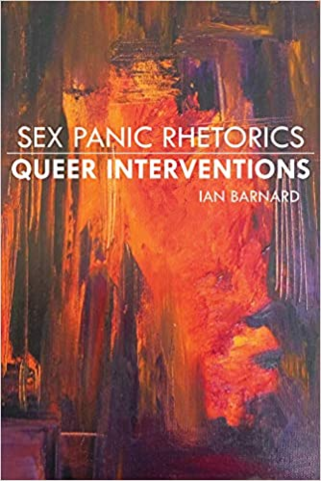Faculty Books: Dr. Ian Barnard Doesn’t Mind Pushing Buttons Sex Panic Rhetorics, Queer Interventions
June 25, 2020
Sex panic. This is the phrase that Dr. Ian Barnard (English/LGBTQ Studies) uses to describe how contemporary liberal culture unintentionally uses sex panics to reinforce transphobic and homophobic tropes. In their new book, Sex Panic Rhetorics, Queer Interventions, Barnard illuminates the ways that the public, media, and politicians produce, construct, and disseminate sex panics.
“The book is kind of meant to push buttons,” says Barnard. “It is probably going to make some people upset and some people panicky.”
The book focuses on sex panics that revolved around sex trafficking, child molestation, incest, gender, queer children, and pedagogy. As Barnard explains, while some of these panics may not appear to be homophobic or transphobic on the surface, the rhetoric that produces them is inseparable from very resilient homophobic and transphobic roots.
When examining the rhetoric surrounding sex trafficking, Barnard notes how the United States has created a tie between aiding the fight against sex trafficking and being against sex work, which serves to preserve conservative ideas about sexuality and the nuclear family.
Their chapter on child molestation explains that while there is a pervasive cultural sex panic around molestation and abduction by strangers, statistics have proven that most child sexual abuse is perpetrated by family members. The frequency and potency of sex panics created around children is a major theme explored in many chapters of Barnard’s book.
In a chapter about  queer kids, for example, they discuss how even the most liberal people, who are LGBTQ advocates, are uncomfortable discussing LGBTQ children. “It’s as if LGBTQ adults didn’t have a childhood,” says Barnard. “People are panicky when talking about sexuality around children, so they act like queer kids don’t exist.” Barnard also explores a correlation between queer kid sex panic and racism, explaining how queerness has been projected onto children of color so that white children can remain innocent, and black children contaminated.
queer kids, for example, they discuss how even the most liberal people, who are LGBTQ advocates, are uncomfortable discussing LGBTQ children. “It’s as if LGBTQ adults didn’t have a childhood,” says Barnard. “People are panicky when talking about sexuality around children, so they act like queer kids don’t exist.” Barnard also explores a correlation between queer kid sex panic and racism, explaining how queerness has been projected onto children of color so that white children can remain innocent, and black children contaminated.
A chapter on pedagogy involves a similar panic. In this chapter, Barnard explores real and fictional instances in which teachers are accused of sexually abusing students. Barnard argues that the fear and rhetoric surrounding these situations is homophobic, citing the film Notes on a Scandal, and the notorious play, The Children’s Hour, as specific examples of queer phobia in fiction. The classroom often figures into sex panics, says Barnard, because teachers are in place of the student’s parents. They mold and shape children and adult students, and people are afraid that teachers are going to indoctrinate, influence and contaminate students.
In another chapter, on transgender panics, Barnard discusses how difficult it is to shed the binary gender system, even for the most well-meaning and transgender supportive individuals. The sex panic they discuss in this chapter, therefore, is about gender rather than intercourse. Barnard argues in favor of transgender theorist Kate Bornstein, saying that “we should only use the word sex when we’re talking about f****ing. Otherwise, just use gender.”
Barnard’s book was just published by the University of Alabama Press, and is currently available through the University of Alabama Press website, as well as Barnes and Noble, Amazon and local bookstores.

